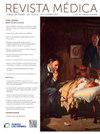卡介苗:膀胱癌免疫治疗后由牛分枝杆菌引起的盆腔脓肿。案例报告
IF 0.2
Q4 MEDICINE, GENERAL & INTERNAL
引用次数: 0
摘要
卡介苗免疫治疗非侵袭性或浅表性膀胱癌是经尿道膀胱切除术后的标准辅助治疗。尽管其有效性和安全性,大约1 - 5%的患者出现局部或播散性(BCGitis)感染不良反应。我们报告一例80岁男性患者,有膀胱癌病史,在诱导期接受膀胱内免疫治疗,因一个月的全身性虚弱史、急性肾损伤和尿培养大肠杆菌ESBL(+)阳性而住院。在新剂量的免疫治疗之前,开始使用亚胺培南进行治疗。腹部和骨盆计算机断层扫描(CT)显示左侧前列腺周围炎性集合累及同侧输尿管伴近端肾积水,该发现与患者的病史相符。完成治疗后,患者出现发热高峰,炎症参数增加。新的CT扫描显示收藏品的生长。脓肿穿刺进行扩展研究,抗酸杆菌镜检阳性,特异性核酸扩增,确认卡介苗所致泌尿生殖器脓肿诊断。开始使用利福平、异烟肼和乙胺丁醇治疗,取得临床改善。本文章由计算机程序翻译,如有差异,请以英文原文为准。
BCGitis: Absceso pélvico por Mycobacterium bovis BCG posterior a inmunoterapia en cáncer de vejiga. Reporte de un caso
Immunotherapy with BCG for non-invasive or superficial bladder cancer is the standard adjuvant treatment following transurethral resection. Despite its effectiveness and safety, approximately 1 to 5% of patients experience local or disseminated (BCGitis) infectious adverse effects. We present the case of an 80-year-old male patient with a history of bladder cancer undergoing intravesical immunotherapy during the induction phase, hospitalized due to a month long history of generalized weakness, acute kidney injury, and a positive urine culture for Escherichia coli ESBL (+). Prior to a new dose of immunotherapy, treatment with imipenem was initiated. Abdomen and pelvic computed tomography (CT) scan revealed a left periprostatic inflammatory collection involving the ipsilateral ureter with proximal hydronephrosis, a finding justified by the patient's medical history. After completing treatment, he experienced a fever peak and an increase in inflammatory parameters. A new CT scan showed growth of the collection. Abscess puncture was performed with an extended study, obtaining positive acid-fast bacillus microscopy and amplification of specific nucleic acids, confirming the diagnosis of urogenital abscess caused by BCG. Therapy with rifampicin, isoniazid and ethambutol was initiated, achieving clinical improvement.
求助全文
通过发布文献求助,成功后即可免费获取论文全文。
去求助
来源期刊

Revista Medica Clinica Las Condes
MEDICINE, GENERAL & INTERNAL-
CiteScore
0.80
自引率
0.00%
发文量
65
审稿时长
81 days
 求助内容:
求助内容: 应助结果提醒方式:
应助结果提醒方式:


